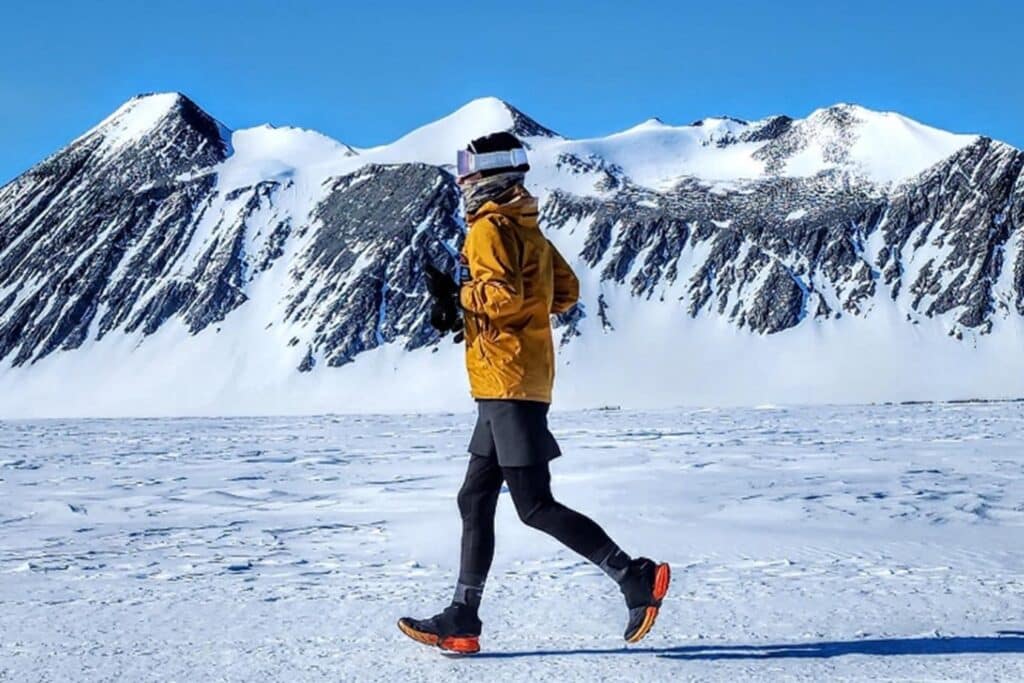Endurance runner and pain scientist Donna Urquhart has broken the world record for the longest run in a polar region after completing a 1300 km ultramarathon across Antarctica.
Urquhart said she set out to claim the record in some of the harshest and coldest conditions on earth to not only push the limits of her own body but also to inspire other women and girls.
“By pushing my own physical boundaries in this world-record attempt I want to show young girls and women what’s possible when you harness the power of the body and mind,” said Urquhart.
In order to prepare for the polar marathon, Urquhart trained for nine months, with her training involved running on a treadmill in a refrigerated shipping container that mimicked the conditions she would face. The container– basically a freezer– could be set to a temperature as low as -40C.
However Urquhart said nothing compared to actually being in the Antarctica and experiencing the extreme conditions first-hand.
She set out on her adventure on December 15, running up to 60km each day to complete a total of 1312.26km in 26 days. Her momentous run was completed on a 10km loop at Union Glacier Camp in Antarctica, the coldest, windiest and driest desert on earth.
“The wind was howling and really strong, to the point where you don’t have the brain power- you almost just shrivel up”, she told SBS, noting that the physical pain left within the first week as her body adapted to the conditions.
The feat surpassed Pat Farmer’s previous record of a 1200m in the arctic as part of his Pole-to-Pole expedition. While Urquhart’s record still needs to be officially signed off from Guinness World Records, it looks to have beaten the standing record.
“It’s a bit surreal to be honest,” Urquhart told AAP on Friday after completing the ultramarathon.
“I feel like I need to pinch myself and then I’ll wake up tomorrow and need to run it again.”
Urquhart and her team, Run Antarctica, will be returning to Melbourne on Tuesday, having raised around $75,000 already to support young girls and women in sport. Her goal is to “raise $1.5 million for charities supporting young girls and women in sport by delivering education training programs that strengthen and empower the body and mind”.
Ahead of her attempt, Urquhart told Sunrise that her dedication to the cause would see help motivate her through the challenges of the record-breaking run.
“We’re aiming to educate and empower girls in sport because 50 per cent of girls drop out of sport during their teenage years,” she said.
“They find it can be stressful and one of the key reasons is a lack of confidence in their skills and abilities, so we’re looking to raise awareness and funds to support them through our charity partners.”
The push to get more women involved in ultra-running
Around the world, there’s been a push to get more women involved in extreme endurance sports, such as ultra-running.
This comes as the Covid pandemic resulted in a 10 per cent drop in female participation across running events of all distances, according to 2023 data from Runner’s World.
One recent campaign in the UK, the Ultra 50:50 from ultramarathon organisers Threshold Sports, is aiming to achieve 50 per cent female participation in its events in 2024.
Through its own data collection, Threshold Sports has found that female participation in 5k races in the UK has fallen from 66 per cent in 2019 to 52 per cent in 2023. The disparity is especially prevalent in ultras, where women make up fewer than a third of participants. Female participation in UK ultras dropped from a depressingly low 32 per cent in 2022 to just 30 per cent in 2023.
To identify the challenges women face when preparing for and taking part in ultramarathons, Threshold Sports and their partners surveyed over 500 female ultrarunners. The results pointed to five key factors including female representation and perceptions, training and preparation, access and support at events, safety and harassment, as well as menstrual health and menopause.
The number one barrier to female participation was cited as “safety” by one in three female ultra runners, due to harassment concerns and fear of running alone at night or in remote areas.
The campaign isn’t simply pushing for women to get involved in its own running events, but is hoping to inspire women to toe the start line in all types of races.
To do this, Threshold Sports has adopted the SheRACES guidelines– a set of guidelines that race directors can follow to ensure races are supportive of female participants. The guidelines range from things like ensuring there are adequate female toilet facilities to providing sanitary products to having equal prize money in competitions.
The group is hoping that by showcasing their own changes, it will provide a blueprint for other event organisers to share in their mission of supporting women and achieving gender parity.
In the build-up to Threshold Sports’ 2024 events season, they’ve also recruited a team of female ultra-runners, or “Challengers” to inspire other women to take up the sport.
One of the Challengers, Romey said: “Becoming a mum is incredible, but it is all-consuming. Signing up to an event I would have completed before parenthood helps me feel like myself again. Plus, I hope to make my daughter proud of her mum one day.”


